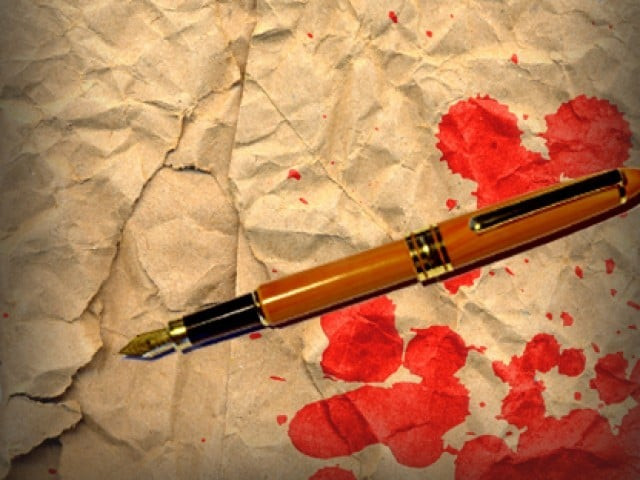Pakistani media: Experts counsel better training, efficient complaint system
80 per cent journalists in Pakistan are aged 40 or younger, says Individualland Pakistan Director.

With 96 journalists killed in the line of duty in the country, Rehmat emphasised the need to improve quality of trainings. PHOTO: FILE
From around 2,000 journalists in 2003 to 18,000 in 2013, the number of trainings for journalists is not reflecting the quality of journalism in the country.
This was stated by Civic Action Resources Media Development Director Adnan Rehmat during a session titled “Pakistani media, a graveyard of trainings” at the third National Media Conference organised by Individualland Pakistan. In collaboration with Friedrich Naumann Foundation, the conference, titled “Evolution of Media: Requirements, Facts and Fears from a Free, Independent and Responsible Media”, saw discussions on areas which can strengthen responsible journalism in Pakistan.

With 96 journalists killed in the line of duty in the country, Rehmat emphasised the need to improve quality of trainings.
“No story is worth a life” he said, adding that the quantity of trained journalists was not resulting in quality journalism. He suggest that media houses start focusing on in-house training facilities to attain better standards of reporting, a gap which has so far been filled by civil society organisations.
Speaking to The Express Tribune, Individualland Pakistan Director Gulmina Bilal Ahmed explained that 80 per cent journalists in Pakistan were aged 40 or younger. While explaining the nature of the programme, she said in Pakistan, there are 15 to 18 organisations that are working to develop skills of reporters.
Ahmed said countries all over the world have a robust system of addressing complaints related to the media, however, in Pakistan there is no one to answer questions of media consumers.
Last year, the Pakistan Electronic Media Regulatory Authority addressed a total of 118 complaints but its effectiveness still remains weak, she added. “They are just mere laws that are not being implemented and need substantial improvement and implementation”.

The first session of the conference focused on ‘Right to Information (RTI)’ and highlighted the need of RTI and the role of media in a democratic society.
Toby Mendel, executive director at the Centre for Law and Democracy, said a total of 95 countries including Pakistan have an RTI law. However, most journalists do not use it or are not aware of it.
While observing rankings, Mendel said that over the last 20 years, the quality of Freedom of Information laws has increased substantially.
Shedding light on Pakistan, he said the law at the federal level remains weak while the law in Khyber-Pakhtunkhwa is ranked stronger than any national law the world over. Zahid Abdullah of the Centre for Peace and Development Initiative said the right has been in existence for more than a decade but its implementation still remains weak.
Angela Aggeler, counselor for public affairs at the US Embassy said Pakistani citizens would not be as informed ten years ago as they are today if it was not for a free and independent media. The two-day conference will continue today with sessions on strengthening press clubs and a talk on “Pakistan’s Media in 2024”.
Published in The Express Tribune, November 28th, 2013.



















COMMENTS
Comments are moderated and generally will be posted if they are on-topic and not abusive.
For more information, please see our Comments FAQ